
In fact, it is adding up. Way too up:
Google has reported that, since 2019, its emissions have grown by 48 percent, an enormous increase that reflects the vast amounts of energy used by artificial intelligence.
A.I. models run a huge number of calculations in short order, taxing computers and driving up energy consumption. “As we further integrate AI into our products, reducing emissions may be challenging due to increasing energy demands,” Google said in its report, released Tuesday. The surge in emissions puts the tech giant further away from its ambitious goal of zeroing out carbon footprint by 2030.
Google is not alone. Microsoft, which is also integrating A.I. into its products, has seen its emissions jump by 30 percent since 2020. It too has a goal of reaching net zero emissions by the end of this decade.
In its report, Google said that it is adopting practices that could dramatically reduce the energy needed to train an A.I. model. It also said that it is using A.I. to tackle climate change in three key ways: by guiding drivers along more fuel-efficient routes; by helping city engineers adjust the timing of stoplights to speed the flow of traffic; and by providing advanced flood warnings to people in more than 80 countries.
Still, the climate impact of A.I. is considerable. Google and Microsoft now have larger carbon footprints than Slovenia.
The marketing hype around A.I. that is far outstripping its current utility also perfectly elides its most profound impact: the electricity required for supercomputing. This gluttonous energy need is hard to overstate – making it very difficult to comprehend – and should be among the primary concerns about A.I., on par with its nefarious effects on news/entertainment, creative pursuits, and surveillance.
So, Siri, is A.I. scary, or just frighteningly impractical?






